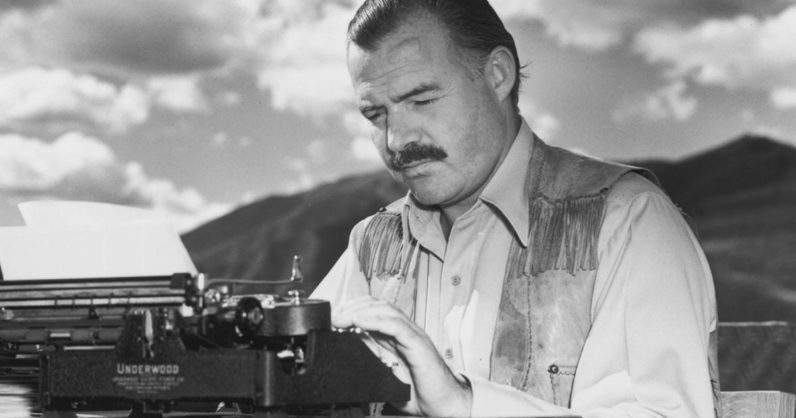Writing a blog post is not the same as writing a Great American Novel, yet some of the best writing advice ever shared applies as much to blogging as it does to other literary genres. Read on to find out what acclaimed authors such as Ernest Hemingway, Mark Twain and Stephen King can teach us all about good writing:

Photo: Ernest Hemingway on his typewriter
All you have to do is write one true sentence. Write the truest sentence that you know.
The hardest part of writing an article is often getting started. Writer’s block isn’t some made-up condition authors use to hide laziness; it’s a common problem that most people in creative professions suffer from on occasion.
The American novelist and Nobel prize winner Ernest Hemingway found a great way to deal with this issue. He would calmly remind himself that he had always managed to write and that he could do so again — all he needed to do was to start with one true sentence that he either knew or had seen or heard someone say.
The first draft of everything is shit.
Hemingway’s words are harsh but honest. Professional writers know that there’s hardly such a thing as getting it “right” on the first try. Your first draft is merely a way to get your ideas on paper (or screen) and to help you see what it really is you want to say. Once you know for sure what that is, it’s time to rewrite.
When you write a story, you’re telling yourself the story. When you rewrite, your main job is taking out all the things that are not the story.
King’s advice is as true for blog posts as it is for the countless works of fiction this best-selling author has produced in his life. Ernest Hemingway’s advice to “Write drunk, edit sober” reflects the same idea.
What you can do:
After finishing the first draft of your blog post, read the text again and deliberately search for information that goes beyond the scope of the article or could potentially confuse your reader.
I notice that you use plain, simple language, short words and brief sentences. That is the way to write English — it is the modern way and the best way. Stick to it; don’t let fluff and flowers and verbosity creep in.
This advice comes from the man who wrote the Great American Novel ‘Adventures of Huckleberry Finn’ and whose words ring particularly true in our time, where texts are being consumed on ever smaller screens by people who have less and less time for ‘fluff and flowers’.
What you can do:
Once you’ve trimmed down your text to what’s really important to your story, it’s time to look at what’s left and how you can improve it.
Tip: Don’t try to force people into reading your article word for word. Most people on the internet are skimmers, and if they can’t find the information they’re looking for quickly, they will leave your page and move on. Accommodate skimmers by using the following best practices:
- Use short words and sentences
- Make important keywords stand out
- Use meaningful H2s to structure your article
- Add bulleted lists
- Use images to keep readers engaged
You learn best by reading a lot and writing a lot.
Talent, an affinity for language, and the right motivation all play a role in your success as a writer. But like most things in life, writing is a skill that has to be acquired and practiced. You don’t have to get a PhD in English Literature to become a successful blogger, but you can learn a lot from the successes and failures of your peers, both in terms of style, format, and content.
What you can do:
Make it a habit to follow bloggers who cover your niche and actively analyze their articles — particularly the ones that are getting the most attention.
Are there any other great writing tips from famous authors that are missing in this post? Share them in the comments below!
Brainstorm and outline blog posts visually
Try MindMeister
